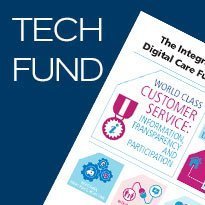226 bids worth £360m made to tech fund 2
- 15 August 2014

The second round of NHS England’s tech fund has received fewer bids than the first, and trusts are looking for less money, according to figures from NHS England.
The first round of the tech fund – officially titled the ‘Safer Hospitals, Safer Wards: Technology Fund’ – attracted 760 expressions of interest, with trusts applying for more than £650m, when £260m was available.
The second round of the fund – known as the Integrated Digital Care Technology Fund – has attracted 226 applications, with trusts looking for just under £360m, when £240m is available.
The second round of the fund is split over two years, and trusts have made bids worth £161m for 2014-15 and £195m in 2015-16.
Karl Grundy, head of EHI’s research arm EHI Intelligence, said the drop might be due to the amount of work triggered by the first round; although some unsuccessful trusts may have been discouraged by the failure of their earlier bids.
There were more applications for integrated digital care record projects, to share information between organisations, than there were for digital care records in single organisations in the second round.
However, there is still strong interest in e-prescribing. Grundy added: “It is interesting that the largest numbers of bids in the second round have come from the areas in which there is a strong government imperative for action.
“NHS England has said that it wants to see trusts moving up the Clinical Digital Maturity Index that we developed in partnership with it, and investing in e-prescribing is a relatively easy way for trusts to do this.
“Ministers have also said that they want to see a focus on e-prescribing in the acute sector and we know they are also putting a renewed emphasis on integrated care records to join health and social services.”
In total, NHS England told EHI that there had been 103 applications for integrated digital care record or sharing projects, and 89 for digital care record or single organisation projects.
There were also another 34 bids for e-prescribing projects. These have been a focus from the outset for the funds, which were set up to support health secretary Jeremy Hunt’s target of a ‘paperless’ NHS by 2018.
The average value of applications to the second fund was just £1.55m. Fourteen trusts received double this amount from the first round of the fund, which eventually distributed just under £182m.
Tola Sargeant from TechMarketView, said there had been a “healthy level” of applications. However, she also felt the decline in both the number and the value of bids suggested that trusts were focusing on successful first round bids rather than taking on new projects.
Sargeant said the greater interest in funding for 2015-16 also suggested that trusts are wary about trying to complete projects before the end of the current financial year.
“There’s not really that much of 2014-15 left now: by the time the applications are approved, they might struggle to spend the money in the timeframes.”
The timeframe in which trusts have to run procurements or complete projects following successful tech fund bids has become an area of concern.
Some £60m of the first tech fund was lost because trusts could not complete projects in time.
E-prescribing companies have expressed particular concern that more money could be lost from the first tranche of the second round because of tough business case and long procurement processes.
The second round of the tech fund also imposed more restrictions on trusts than the first. Trusts could not receive more money for projects that won last year, or get funding for projects that are being supported in other ways.
They could also submit just one bid, plus a joint bid for an IDCR project. The review process will now include an assessment of all applications by a small panel and a one-hour assessment interview in Leeds or London.
Successful applicants will sign an agreement outlining their obligations, including tracking and publicising benefits, before they receive funding.
Overall, Sargeant argued that the fund is likely to have a positive effect on the health systems market over the next couple years, but its impact will be lessened by trusts coming to the end of their National Programme for IT contracts.
“It will boost growth somewhat, but with national programme revenue falling out [it] might not be as much as you would imagine.”




